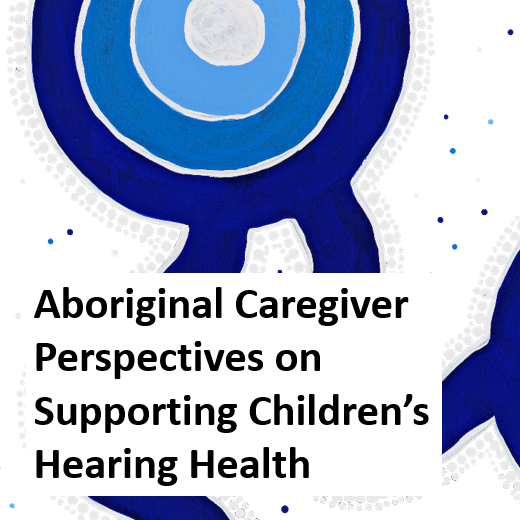
Aboriginal Caregiver Perspectives on Supporting Children’s Hearing Health
Aired live 2nd December 2022
What are the experiences of Aboriginal caregivers in supporting their children’s hearing health and language development? What are their experiences of audiology and speech pathology services?
Hear from a panel of Aboriginal and non-Indigenous researchers about a recent study exploring the perspectives of Aboriginal and Torres Strait Islander caregivers of young children with hearing problems on 1) how they support their children’s hearing health and language development; 2) on audiology and speech pathology services.
With oversight from an Aboriginal Research Leadership Team, this study aimed to privilege the voices and experiences of Aboriginal and Torres Strait Islander caregivers. The insights and suggestions from caregivers can help improve support pathways and services, to ensure family-centred, culturally responsive services and clinical care.
Learning Objectives:
- Learn about how Aboriginal caregivers support their children’s hearing health and language development and the challenges they face with navigating pathways and with audiology and speech pathology services
- Learn about what Aboriginal caregivers have found helpful, what improvements they recommend for pathways and services, and how these insights can inform family-centred and culturally safe care.
Meet the Panel
Isabel O’Keeffe – Senior Research Scientist, NAL
Isabel first developed her interest in Aboriginal languages, music, and culture during her childhood living and going to school in the Anungu Pitjantjatjara Community of Pukatja (Ernabella) in Central Australia. During her PhD research, she worked closely and collaboratively with Aboriginal elders, ceremony holders, singers, dancers, and other community members in western Arnhem Land communities (Northern Territory) to document languages and songs of this highly multilingual region. For over 14 years, Isabel has worked on various projects with Aboriginal communities, including most recently in her role of Project Coordinator (Aboriginal and Torres Strait Islander Research) at Hearing Australia alongside Community Partnerships Lead, Wiradjuri researcher Dr Michelle Kennedy (University of Newcastle). Isabel is passionate about working respectfully and collaboratively with Aboriginal and Torres Strait Islander research colleagues and communities, and about translational research that builds local capacity.
Meagan Ward – Clinical Lead Community Outreach, NAL
Meagan is Clinical Lead Community Outreach in the Communication Sciences Department. A non-Indigenous audiologist, Meagan lives on Gadigal land in Sydney, NSW. Meagan has worked with Hearing Australia as a paediatric audiologist and with the Aboriginal and Torres Strait program doing outreach work across remote, urban and regional areas. Meagan has been involved in several projects with NAL over the last two years including: developing and validating the PLUM and HATS listening and communication checklists; the Urban Hearing Pathway project -understanding how service access impacts the burden of avoidable hearing loss experienced by young Aboriginal and Torres Strait Islander children and families in urban areas; and the Timeframe project- developing an optimal timeframe for ensuring children with persistent middle ear problems are helped to hear well again.
Trumaine Rankmore – (Wiradjuri, Ngemba, and Gomeroi nations), Aboriginal Health Practitioner, IPN Medical Centres
Trumaine is a proud Wiradjuri man from Dubbo with family connections to Gomeroi and Ngemba nations. Trumaine has been working in Aboriginal health since 2012, he has been AHPRA and Medicare registered Aboriginal Health Practitioner (AHP) since 2016.
Trumaine commenced his Aboriginal health worker journey within a ACCHO where he learnt the fundamentals of Aboriginal health. This experience provided him with the knowledge and skills to transfer across to now providing health care within a mainstream General Practice. Trumaine also works part time in ear health research at University of Newcastle, HMRI and Hearing Australia where he has been provided the opportunity to co-author a paper on this research.
He draws on this experience to promote and ensure that Aboriginal community accessing the service receive a culturally safe and responsive experience.
Trumaine’s passion is supporting Indigenous people through their health journey with a particular interest in the treatment and management of Chronic Disease. Trumaine has seen first-hand the social and emotional well-being complications and the impact these health difficulties have on the family network.
Trumaine is driven to elevate the status of Aboriginal health practitioners within General practice and has an ambition to study medicine in the future where he hopes to continually impact the lives of Indigenous people throughout Australia.
Toni Manton – (Gampingal, Worimi nation), First Nations Health Access & ITC Services Coordinator, Hunter New England and Central Coast Primary Health Network (HNECC PHN)/Aboriginal Project Officer, University of Newcastle)
Toni is a proud Gampingal woman from the Worimi nation. She has extensive experience working in the Aboriginal health sector in the Hunter New England and Central Coast region. She also has considerable experience as a research officer, including previously working for Hearing Australia’s Urban Hearing Pathways project. Toni is a member of the Aboriginal Research Leadership Team that provided cultural oversight into the Caregiver Perspectives project.
